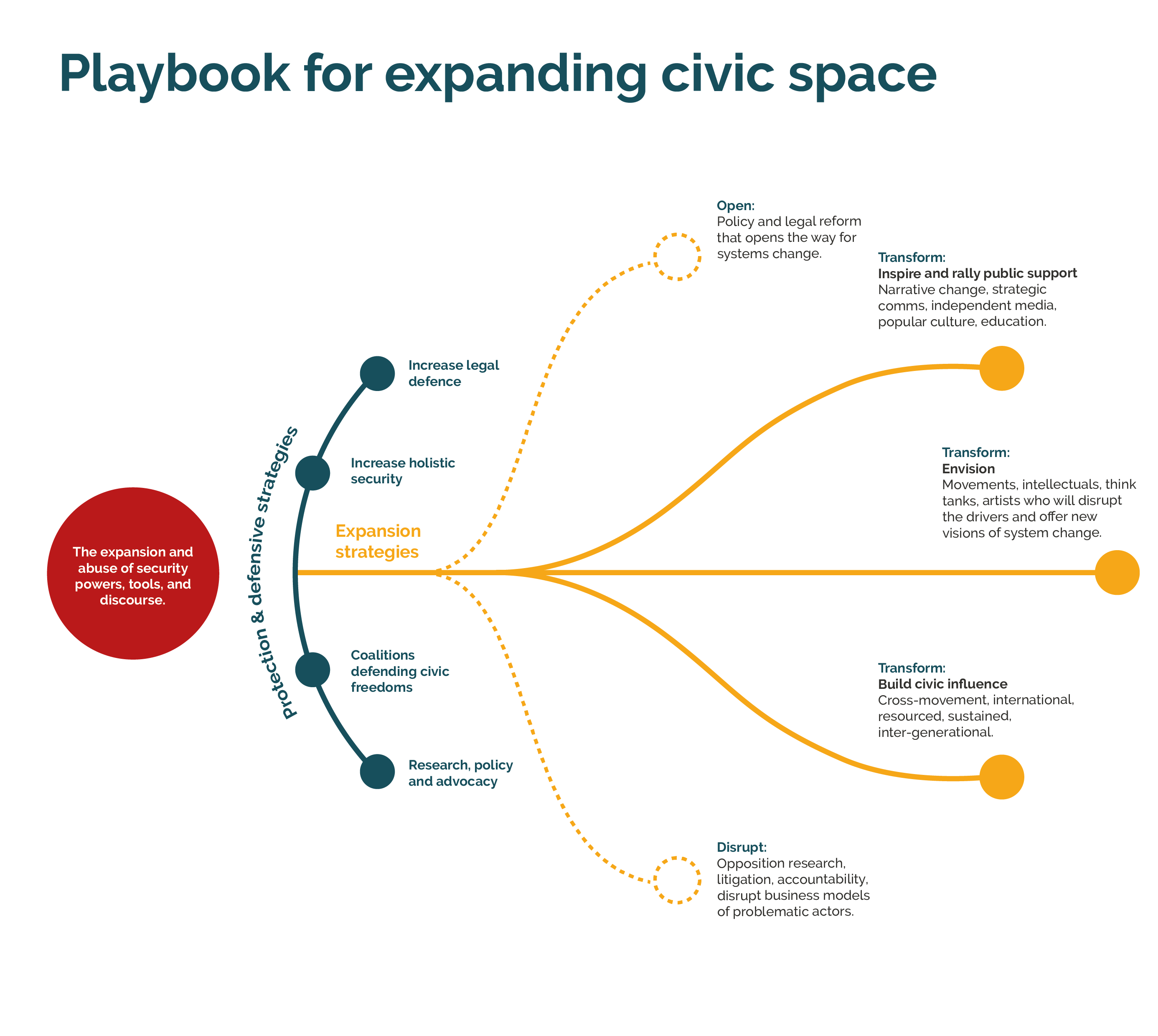
The Security Playbook 101
Building on Rethinking Civic Space, the major review published by FICS in 2020, this month we released The Security Playbook 101, a new paper that demonstrates the expansion and abuse of security powers, tools, and discourse by states in ways that criminalise and restrict activists.
The playbook also offers solutions for how philanthropy can support civil society to disrupt, reform and transform this trend.
Our roots
FICS was founded to develop cutting edge analysis for funders and to support movements with the resources needed to tackle the dominant drivers that sit behind growing restrictions on rights of assembly, association and other fundamental freedoms. We launched Civic Futures, with the Fund for Global Human Rights, in 2021 to prioritise the learnings from our 2020 review – to bring strategic attention to national security overreach and to develop tools for funders to respond to this world-shaping phenomena.
The playbook
The Security Playbook is the set of tactics misused or abused by states around the world that advocates the curtailing of civic space and democracy under the aegis of security. It consists of three elements, which are employed in different combinations to varying extents by governments:
FRAMEWORKS - Abuse of security frameworks to silence dissent:
A growing transnational security architecture—led by the UN and comprising 38 UN agencies and over 200 bodies—sets global counterterrorism, violent extremism and national security standards. Once a check on state infringements of human rights, the UN, which leads the transnational security architecture, has done little to prevent states implementing far-reaching counter terrorism and security laws and norms being used to restrict civic freedoms. As a result, we’ve seen across the globe vague and pre-emptive laws and frameworks being used to counter democratic opposition and individuals exercising their fundamental rights.
NARRATIVES - Promotion of the security narrative to justify restrictions underpinning the Security Playbook is a powerful narrative:
Threats facing us are so severe and those who may threaten us are so many and so unpredictable, that only hard security measures can keep us safe. In turn these actions are justified and made ‘common sense’ through public and corporately owned media. These threat-based concerns are leveraged by actors that serve both distinct and overlapping agenda, including politicians, illiberal conservatives, far-right groups and private sector interests. In practice, this takes the form of smear attacks against activists, journalists, human rights defenders who are ‘supporting’ or ‘promoting’ terrorism.
TECH - Use of technology to surveil and censor:
Technology is increasingly being exploited by States to target civil society organising online; using mobile phone records and geolocation data to monitor and obstruct the funding of CSOs. Large tech platforms and telecoms companies are also increasingly pro-active – or legally obliged – to police their users’ activities for “security threats”: on social media platforms or telecommunications networks more broadly; in the international banking and travel systems; and in the protection of the “critical infrastructure” that is often the target of protest or dissent.
These three elements are developing with extraordinary momentum and will be the dominant driver shrinking civic space over the next decade
What next…
To effectively counter attacks on democracy and rights we have developed the ‘Disrupt, Reform, Transform’ model.

This model offers the funder community a tool to map the strategies we are already supporting, identify opportunities to share and align our work, and identify where there are critical gaps where funders could make a real difference
The field of actors countering the Playbook is small, fragmented, and massively underfunded. This moment presents an unprecedented opportunity for funders committed to strengthening civic freedoms to come together with those who support those movements most impacted by criminalisation, surveillance, and harassment, to begin to identify a vision for a future unhindered by the Security Playbook and a roadmap for realising this.



